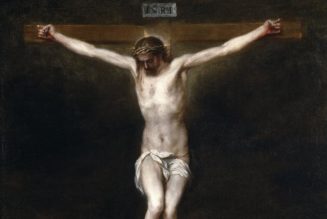
Mark Twain’s book on St. Joan of Arc shows that God can work spectacularly through the unlikeliest of candidates, whether humble maidens or skeptical authors.
“I like Joan of Arc best of all my books, and it is the best; I know it perfectly well. And besides, it furnished me seven times the pleasure afforded me by any of the others; twelve years of preparation, and two years of writing. The others needed no preparation and got none.” —Mark Twain
Mark Twain’s Joan of Arc is perhaps the finest novel ever to have been written by an American. It’s a book with the power to change the lives of its readers. Yet I’m typically greeted with a surprised look, whenever I mention it to friends, over having strung together the names “Joan of Arc” and “Mark Twain” so closely in the same sentence. The greatest work penned by the man who is widely considered to be America’s greatest-ever author remains obscure today.
Mark Twain himself had initially insisted upon anonymity while the book was first being published in serialized installments in Harper’s Magazine, in hopes that that way the public would take it more seriously.
I’d purchased my own copy of Joan of Arc before a vacation, some months back, knowing that I’d soon be having plenty of reading time while on airplanes and buses. At the time of this purchase, my interest in reading a book written by Mark Twain, rather than about St. Joan of Arc, was greater. My interest in the life and character of St. Joan grew with every page.
Twain’s research in preparation for the writing of this book was very meticulous. Told through the eyes of Joan of Arc’s fictional page, who is loosely based upon her actual page, it is a detailed recalling of the saint’s deeds, whether famous or obscure, and an exploration of what extraordinary effect that her character surely must have had upon those she’d touched. It is a novel that is filled with excitement, which is hardly surprising considering the subject. Twain wrote while describing the Siege of Orléans:
When she felt the sharp pain and saw her blood gushing over her breast, she was a frightened, poor girl, and as she sank to the ground she began to cry bitterly. The English sent up a glad shout and came surging down in strong force to take her, and then for a few minutes the might of both adversaries was concentrated upon that spot. Over her and about her, English and French fought with desperation — for she stood for France, indeed was France to both sides — whichever won her won France, and could keep it forever. Right there in that small spot, and in ten minutes by the clock, the fate of France, for all time, was to be decided, and was decided …
What I found very surprising about the novel, considering some of the author’s notions, was how the novel never shied away from, nor downplayed, the great faith of St. Joan of Arc which had driven her to do her great deeds. Twain, a preeminent author of the American Realism movement, simply couldn’t circle around the saint’s faith while penning a realistic novel about her. Joan of Arc was much lengthier than a typical novel by Mark Twain, thus giving the reader that much more time to be immersed in the life of a saint. This book kindled my desire to live a holy life in a way that I’d not encountered since having read Dostoevsky’s The Brothers Karamazov.
Mark Twain was not a Catholic. That he’d had strong reservations concerning organized religion was no secret. A Connecticut Yankee in King Arthur’s Court, one of his most famous novels, was even highly critical of the Church. And yet the reverence displayed throughout Joan of Arc could fool any reader into believing that its author must surely have been a devout Catholic, or perhaps even a priest, if only that reader would refrain from checking whose name it is on the cover. Twain wrote of her:
The contrast between her and her century is the contrast between day and night. She was truthful when lying was the common speech of men; she was honest when honesty became a lost virtue; she was a keeper of promises when keeping a promise was expected of no one; she gave her great mind to great thoughts when other great minds wasted themselves upon petty fancies or poor ambitions … she was of a dauntless courage when hope and courage had perished in the hearts of her nation. … She was perhaps the only entirely unselfish person whose name has a place in profane history. No vestige or suggestion of self-seeking can be found in any word or deed of hers.
A life well-lived, that is driven by deep faith, has the power to captivate. The astounding life and example of St. Joan of Arc had managed to captivate even Samuel Clemens himself, as he wrote of her: “… the most noble life that was ever born into this world save only One.”
The story of a peasant girl, insisting she’d been called by God, who goes on to lead an army on the brink of annihilation and turn the tide of a century-long war in a mere matter of months, is indeed very compelling. The trial of an illiterate girl, falsely accused, brilliantly defending herself before a kangaroo court, is likewise a compelling story, albeit with a tragic ending. Twain wrote of her trial:
Joan looked out upon these hungering faces with innocent untroubled eyes, and then humbly and gently she brought out that immortal answer which brushed the formidable snare away as it had been but a cobweb: ‘If I be not in a state of Grace, I pray God place me in it; if I be in it, I pray God keep me so.’
But Twain’s Joan of Arc, like any good novel, is far more than a mere narrative of events. It is an articulation of a living saint’s great power to inspire.
On her appearance, Twain wrote:
Joan’s eyes were deep and rich and wonderful beyond anything merely earthly. They spoke all the languages — they had no need for words. They produced all effects — and just by a glance, just a single glance: a glance that could convict a liar of his lie and make him confess it; that could bring down a proud man’s pride and make him humble; that could put courage into a coward and strike dead the courage of the bravest; that could appease resentments and real hatreds; that could speak peace to storms of passion and be obeyed; that could make the doubter believe and the hopeless hope again; that could purify the impure mind; that could persuade — ah, there it is — persuasion! that is the word; what or who is it that it couldn’t persuade?
On her tenderness, Twain wrote:
When all our host was shouting itself hoarse with rejoicings, and there went up a cry for the General, for they wanted to praise her and do her homage for her victory, we had trouble to find her, and when we did find her, she was off by herself, sitting among a ruck of corpses, with her face in her hands, crying — for she was a young girl, you know, and her hero-heart was a young girl’s heart too, with the pity and tenderness that are natural to it. She was thinking of the mothers of those dead friends and enemies.
On her faithfulness, Twain wrote:
Joan of Arc was not made as others are made. Fidelity to principle, fidelity to her word, all these were in her bone and in her flesh — they were parts of her. She could not change, she could not cast them out. She was the very genius of Fidelity, she was Steadfastness incarnated. Where she had taken her stand and planted her foot, there she would abide; hell itself could not move her from that place.
And on her piety, Twain wrote:
By command, Beaupere resumed his examination of the accused. It being Lent, there might be a chance to catch her neglecting some detail of her religious duties. I could have told him that he would fail there. Why, religion was her life!
St. Joan of Arc is a model for us, as are all of the saints. Her life is historical proof that Providence can work spectacularly through any of us, including the unlikeliest of candidates, so long as our hearts are filled with the humility that makes our ears receptive to God’s calling. Those astonishing deeds that had been performed through the Maid of Orléans had been destined for to do her in particular. But the call to surrender to God, to thus open ourselves to the faith through which all things become possible, is for all of us. St. Joan of Arc had surrendered herself so, and shown all of us what those possibilities are.
St. Joan of Arc’s ability to inspire didn’t end with her martyrdom in 1431. The memory of her has been with us through the centuries. It was at the end of the 19th century that a humorist and cynic, who likewise would’ve been considered an unlikely candidate for the task ahead, had penned the most Catholic of novels for us so that the memory of her would remain alive today.
St. Joan of Arc, pray for us!
“Truth is stranger than fiction, but it’s because Fiction is obliged to stick to possibilities; Truth isn’t.” —Mark Twain









